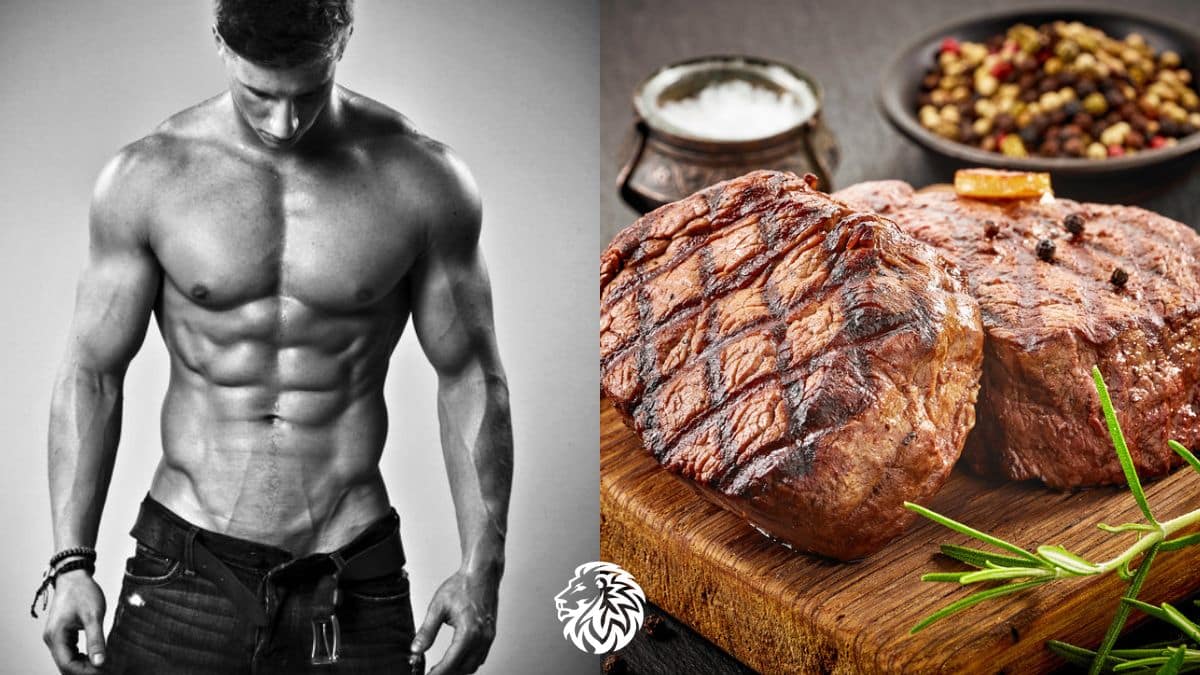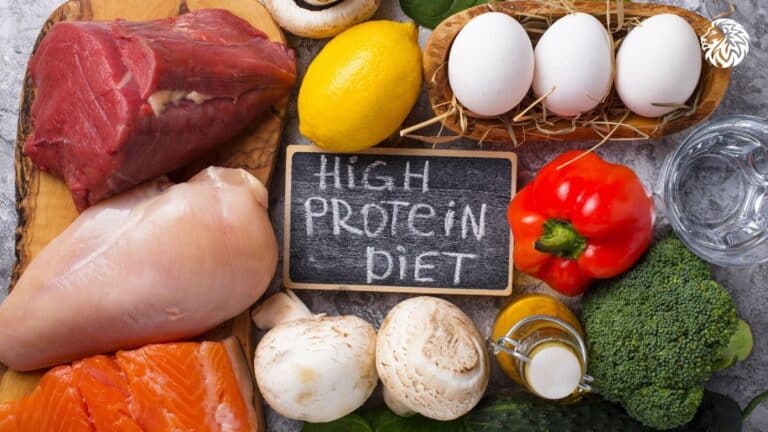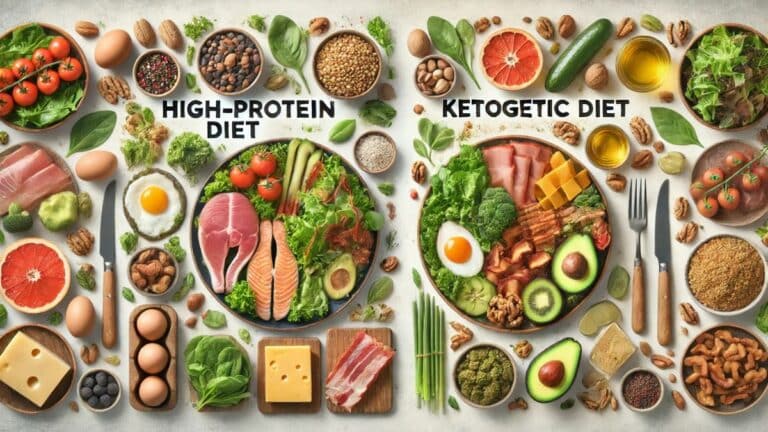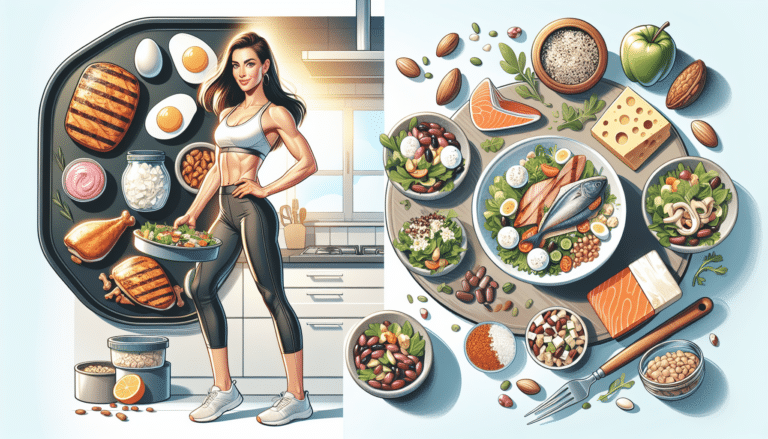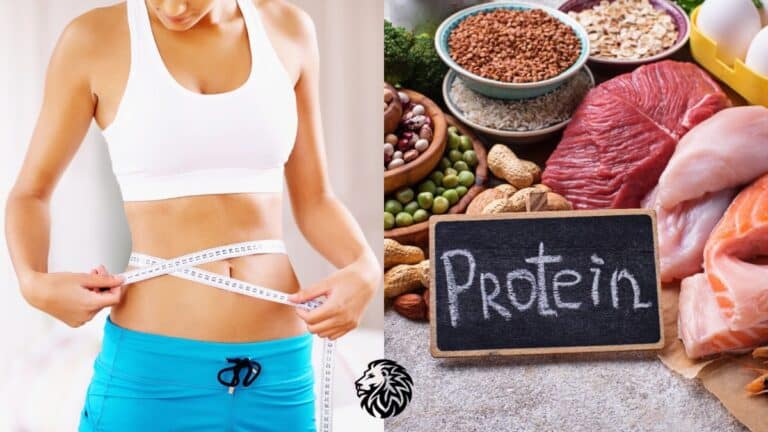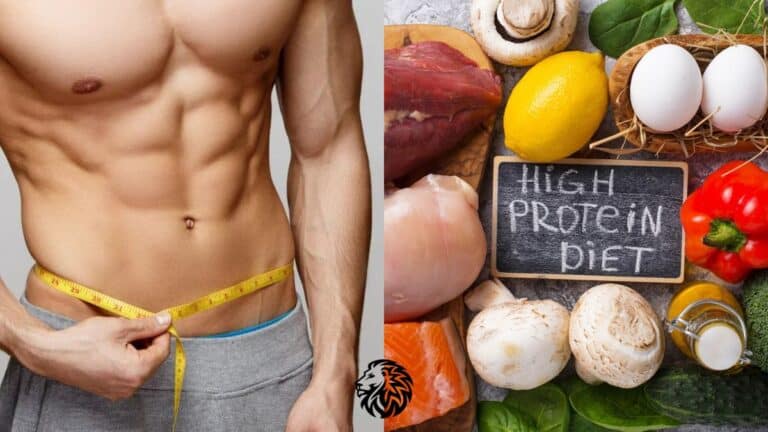Building muscle isn’t just about hitting the gym; it’s about what you put on your plate. Protein is the cornerstone of muscle growth, recovery, and performance. A high-protein diet plan for muscle gain doesn’t just help you get stronger—it supports faster recovery, boosts your metabolism, and keeps your energy levels steady. Whether you’re pushing for that next PR or simply trying to feel more confident and capable, giving your body the right fuel is key. Let’s dive into how protein can power your progress and transform your fitness journey.
Understanding High-Protein Diets
Importance of Protein Intake
Protein ain’t just a fancy word on your nutritional label; it’s the stuff your body desperately needs! Every cell in your bod is basically screaming for a little protein love. Whether you’re sprouting up, developing, or fixing that pulled muscle from pretending you’re still 18 at the gym, protein’s got your back (Harvard Health Publishing). So, if you’re dreaming of muscles that could rival a Marvel superhero, start with protein.
Pump in those proteins post your sweaty workout session, and watch how your muscles nod in approval. They recover faster, swell the right way, and make you look more toned. If you’re curious about where to start with all this protein goodness, check out our guide to the best high-protein foods. It’s a menu your muscles will seriously appreciate.
| Protein Perk | What It Does |
|---|---|
| Muscle Fix | Mends muscles that cry after exercise |
| Growth Spurt | Fuels your body’s growth and development |
| Tissue Maintenance | Builds you up, cell by cell |
Protein and Muscle Building
Wanna pack on muscle? Here’s the skinny: aim to munch on 1.4 to 2 grams of protein for every kilo you weigh, each and every day (Healthline). Pair it with good ol’ sweat sessions, and you’re on a fast track to buff city.
Most of us, according to the sages at the International Society of Sports Nutrition, can hit these protein targets to get those muscles strong and proud (Medical News Today). But don’t just fill up on protein alone – your plate needs a splash of vitamins, some healthy fats, and a dash of minerals to keep the whole show running smoothly (Medical News Today).
Consider chicken your newest post-workout pal, swooping in to help you shave off some fat while buffing up those muscles (Healthline). If your brain’s stuck on what to cook, we’ve got some tasty high-protein diet meal ideas ready to roll.
| Activity Level | Protein Intake (g/kg body weight) |
|---|---|
| Kinda Active | 1.4 – 1.6 |
| All-Out Training Beast | 1.6 – 2.0 |
Stocking up on protein could be your ticket to quicker recovery post-workout and overall better performance. Want to see the full scoop? Swing over to our high-protein diet and muscle recovery guide.
Getting the lowdown on just how vital protein is in your meal game, especially if muscle’s your middle name, will let you craft a high-protein diet plan for muscle gain that fits all your fitness aspirations snugly. So, go on, make those muscles sing.
Benefits of High-Protein Diets
Eating a lot of protein can do wonders if you’re trying to bulk up and stay healthy.
Muscle Mass Preservation
To keep those muscles in tip-top shape, getting enough protein is a big deal. Research shows that packing in protein helps build muscle, make it stronger, and even protect it when you’re cutting down weight (Healthline). It’s a must-have for anyone looking to get fit and stay strong.
| Factor | Low-Protein Diet | High-Protein Diet |
|---|---|---|
| Muscle Mass Preservation | Low | High |
| Muscle Growth | Moderate | Enhanced |
Increased Metabolism
Protein can kick your metabolism into high gear. Your body burns more fuel digesting protein than it does with carbs or fats, making you torch those extra calories even as you go about your day. There are studies backing what seems like a mini-workout’s effectiveness in calorie burning (Healthline). If curious, check out why protein and metabolism are BFFs.
| Diet Type | Caloric Burn (additional calories per day) |
|---|---|
| Low-Protein Diet | 100 |
| High-Protein Diet | 200-300 |
Curbing Late-Night Snacking
Battle your midnight munchies with protein. It’s been found that more protein can shrink cravings and keep those late-night pantry raids in check. This might have to do with the feel-good hormone dopamine getting a boost from protein, cutting the call for junk foods (Healthline). Want more? Peek into our piece on diet and satiety for the lowdown.
| Factor | Low-Protein Diet | High-Protein Diet |
|---|---|---|
| Late-Night Snacking Frequency | High | Low |
| Cravings Control | Moderate | Improved |
These perks are just the beginning when doubling down on protein for gaining muscle. To dive further into the upsides, swing by our diet benefits section.
To get the best of your protein-packed lifestyle:
- Check out the top picks for high-protein foods.
- Discover fab meal ideas to keep that protein punch.
Health Impacts of High-Protein Diets
Yours truly has to admit, high-protein diets are like that trendy new pair of sneakers — they look good and feel even better, but you’ve got to really know what they’re doing to your overall health. So, let’s have a chat about healthy bones, blood pressure, and any tiny tripwires you might want to be wary of when you’re packing in the protein.
Bone Health
Think of protein as the cement keeping your bones together. As you age (gracefully, of course), upping your protein game can actually lower your risk of fractures and osteoporosis. When you’re on a high-protein diet, you tend to preserve better bone mass compared to those who skimp on the protein taco. It’s like giving your bones a hug that keeps their strength and density in check. Curious about more perks of protein? Swing by this link.
| Protein Intake | Bone Mass Preservation |
|---|---|
| High | Strong Like Bull |
| Low | Not So Strong |
Stat-chat brought to you by Healthline.
Blood Pressure Management
Who knew that getting your protein on could do a number on your blood pressure — in a good way? Munching on more protein could have your systolic and diastolic numbers looking snazzy. Plus, it might even help with kicking LDL, aka bad cholesterol, and triglycerides to the curb.
| Health Measure | Effect of High Protein |
|---|---|
| Systolic Blood Pressure | Chill Out |
| Diastolic Blood Pressure | Lowered |
| LDL Cholesterol | Going Down |
| Triglycerides | See Ya Later |
Brought to you by our pals at Healthline.
Potential Risks of Excessive Protein Intake
Now, before you go hog-wild, there’s a catch. Gorging on protein like it’s going outta style can mess things up. More than 2 grams per kilo of your fine self per day and you might be singing the kidney stone blues. That’s right; too much protein can give your kidneys a rough time and may play mischief with your liver and heart too.
| Adverse Effects | Linked With Excess Protein |
|---|---|
| Kidney Roadblocks | Up You Go |
| Stones in the Works | Watch out |
| Uric Acid Buildup | Keep an Eye |
| Calcium Imbalance | Risky Business |
| Cancer Woes | Maybe, Maybe Not |
| Liver Issues | Be Alert |
| Heart’s Well-being | On Edge |
For more deets, check out PubMed Central and Medical News Today.
Tuning into how protein’s playing out in your life is like being your own health DJ. Keep it balanced, follow the groove of guidelines, and you’ll be strutting those health benefits in style while sidestepping the nasty bits. Still hungry for tips and meal magic? Check out this link for some tasty tidbits.
Optimal Protein Intake
Protein Requirements for Muscle Gain
Building muscles isn’t just about pumping iron; it’s about what you’re eating too. Your protein intake is like the backstage crew, making sure everything’s set for the main show – muscle gain. Depending on whether you’re young, not-so-young, a guy, a girl, a marathon runner, or a couch potato trying to shift gears, your protein needs may vary. The gym buddies from the International Society of Sports Nutrition say that grabbing 1.4 to 2.0 grams of protein per kilogram of body weight is usually good enough for most folks plugging away at resistance training. But if you’re pushing yourself to the edge with intense workouts, you might want to stash up 3 grams per kg.
General Protein Requirements for Muscle Gain:
| Body Stuff on Scale | Minimum Protein Game (g) | Max Protein Game (g) |
|---|---|---|
| 50 kg (110 lbs) | 70 g | 150 g |
| 70 kg (154 lbs) | 98 g | 210 g |
| 90 kg (198 lbs) | 126 g | 270 g |
Protein Intake for Recovery
Cinderella might have her pumpkin, but you need protein for your post-exercise ride back to normal. After sweating it out, your muscles crave help to rebuild, and that’s where protein comes in. Those smart folks at MDPI recommend gobbling up the right amount of protein soon after your sweat session to give your muscles a helping hand. Anywhere from 1.2 to 2.0 grams of protein per kilogram of body weight should do you fine.
But hold up! It’s not just about wolfing it all down in one go. Spread out your protein munchies throughout the day to keep those muscle builders working round the clock. For more banging tips on mixing a high-protein diet with muscle magic, check out our special spot.
Post-Exercise Protein Guidelines:
| When to Stuff Yourself | Protein Snackage Recommendations |
|---|---|
| Right After Gym Time | 20–30 g |
| Next Meals | 20–30 g per meal |
Keeping a sweet balance between sweating it out and protein munching gives your body what it needs to ace those workouts. So, whether you’re new to this or you can squat a bus, knowing your protein numbers keeps you cruising on your fitness path.
Peek into more about high-protein fuel and pumped-up energy to keep the bounce in your step every single day.
Protein Sources for Muscle Building
Want to bulk up those biceps or sculpt those quads? Well, reaching your muscle-building goals starts with a little protein magic. Whether it’s a juicy steak, a hearty scoop of tofu, or a nifty powder shake, different protein sources have your back in this journey to muscleville.
Animal-Based Protein Sources
Animal-based proteins are muscle’s best friends, packed with all the amino acids your body needs for big-time gains and post-gym recovery. Check out these meaty MVPs:
| Protein Source | Protein Content (per 100g) |
|---|---|
| Chicken Breast | 31g |
| Lean Beef | 26g |
| Salmon | 25g |
| Tuna | 29g |
| Eggs | 13g |
| Greek Yogurt | 10g (twice the whey of regular yogurt) |
Greek yogurt isn’t just a creamy treat; it’s a blend of fast-action whey and leisurely-digesting casein, setting the stage for muscle TLC (Healthline). And let’s not forget beef and eggs which are all muscle-bound ready to fire up your muscle fibers.
If you’re hungry for more info, peek at our article on best high-protein foods.
Plant-Based Protein Sources
Prefer your protein a bit more earthy? No problem! Plant-based proteins are here with low-fat, nutrient-rich prowess for vegetarians and vegans alike.
| Protein Source | Protein Content (per 100g) |
|---|---|
| Lentils | 9g |
| Chickpeas | 8g |
| Quinoa | 4g |
| Tofu | 8g |
| Pea Protein (Isolate) | ~80g |
Pea protein packs a punch for ramping up your recovery post-gym (Clif Bar UK). Lentils, chickpeas, and quinoa are like blank canvases ready to jazz up any dish.
Need culinary inspo? Our guide on vegetarian high-protein diet is worth a click.
Protein Supplements
Busy day? Just hit the protein supplement station for a smooth and speedy protein fix, perfect when your calendar’s tighter than your gym shorts.
Popular Protein Supplements:
- Whey Protein: All about quick action with a full house of amino acids, packing 20-30 grams a scoop. Perfect for when you’re in a post-sweat rush (UnityPoint Health).
- Casein Protein: This snail-paced digesting hero helps your muscles recover when the moon’s up.
- Pea Protein: Winning the hearts of vegans everywhere—it’s dairy-free and straight-up awesome.
- Protein Bars: Snack heroes with 10-15 grams, no fuss, just good stuff, and leave those sugar traps on the shelf (UnityPoint Health).
| Supplement Type | Protein Content (per serving) |
|---|---|
| Whey Protein | 20-30g |
| Casein Protein | 24g |
| Pea Protein | ~20g |
| Protein Bars | 10-15g |
Got a taste for more on the go? Check out our list of protein shakes and bars.
Mix these muscle-friendly proteins into your meals, and you’ll be on your way to building strength while keeping things delicious and varied.
Considerations for Protein Consumption
So, you’re pumped about building those muscles, huh? Well, let’s talk protein—the building block your muscles will absolutely love. Here’s the scoop on getting it right.
Daily Protein Intake Guidelines
Alright, let’s cut to the chase. How much protein do you actually need to make those guns pop? Depending on how much you’re hustling at the gym, the magic number lies somewhere between 1.4 to 2.0 grams per kilo of your body weight. That’s what the pros at the International Society of Sports Nutrition say. But if you’re really going at it like a beast in high-intensity resistance workouts, crank it up to 3 grams per kilo.
| Your Gym Style | How Much Protein (grams per kg) |
|---|---|
| Regular Exercise | 1.4 – 2.0 |
| Beast Mode (High-Intensity) | Up to 3.0 |
Want to geek out more on this? Check out our article about protein needs for high-octane athletes.
Tips for Protein Distribution
Spreading out your protein love throughout the day can really flex your gains. Forget about chowing down a giant steak in one sitting; keep that protein steady, like eating steady throughout your meals and snacks.
Protein Game Plan:
- Breakfast: Power up with eggs, Greek yogurt, or a protein shake.
- Lunch: Chow down on lean meats, fish, or go green with beans and lentils.
- Dinner: Load up on proteins, veggies, and whole grains.
- Snacks: Grab nuts, cheese, or a protein bar while on-the-run.
Looking for even more delicious ideas? Our meal plan guide has got your back.
Protein Shakes and Bars Recommendations
Life’s busy, we get it. That’s why protein shakes and bars are like your best gym buddies—they’re handy for quick protein fixes. Whether you need a post-workout punch or a hangry lift, here’s what to look for:
- Protein Power: At least 20-30g per serving.
- Skip Sugar Loads: Low sugar wins.
- Well-Balanced: All-around macronutrients for staying healthy.
What to Grab:
- Whey Shakes: Speedy absorption, perfect right after sweating it out.
- Casein Shakes: Sip before catching Z’s for overnight gains.
- Plant-Based Shakes: For plant-lovers and dairy dodgers.
- Protein Bars: Pocket-sized energy bars, easy for munching anywhere.
| Shake or Snack | Best Time to Munch or Sip |
|---|---|
| Whey Protein Shake | After Lifting Weights |
| Casein Protein Shake | Before Dreamland Rumbles |
| Plant-Based Shake | For Vegan Warriors |
| Protein Bars | Portable Snack Magic |
Dive deeper into the awesome world of shakes and bars with our review section.
By sticking to these down-to-earth tips, you’ll set your body up for muscle magic and recovery. And hey, don’t sideline those important vitamins, minerals, and healthy fats—they’re part of keeping you in top shape too. Hungry for more? Jump into our posts about high-protein benefits, smart meal plans, and must-have foods.
